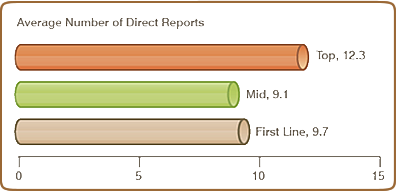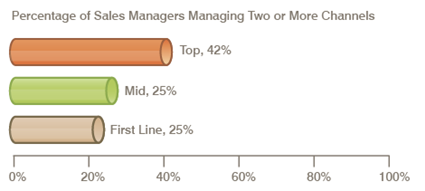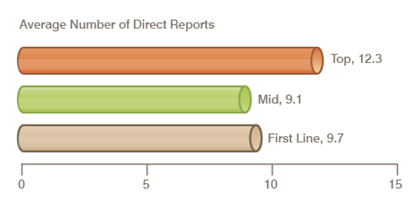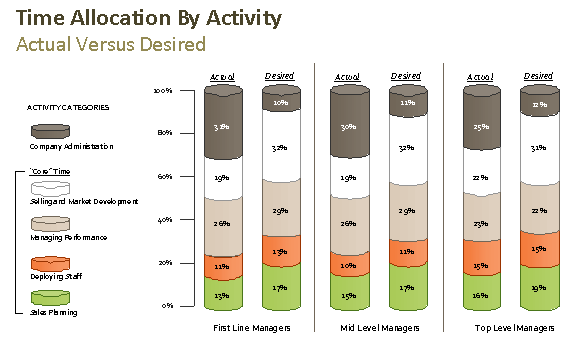
Judging sales managers’ effectiveness is not a simple matter. The sales management role – like the sales positions it manages – grows ever more complex, demanding, and diverse. In many firms, sales managers’ responsibilities change more dynamically than any other comparable management position, often in response to urgent realignments of market, growth, or customer priorities. Given these realities, there is no single metric or yardstick by which leadership can gauge the effectiveness of their sales management corps.
SUMMARY OF KEY FINDINGS
Time Allocation Decisions Matter

That said, any exercise in measuring sales management quality should include a review of sales managers’ time allocation. This study demonstrates correlation between the time managers spend in critical sales management activities and positive growth results. Based on a research effort conducted with the assistance of Growth Solutions LLC, a leading sales effectiveness consultancy, and the responses of more than 300 participants, the study attempts to establish meaningful baseline data on typical sales management time allocation, and the breadth and scope of the sales management role in participating firms.
Time truly is one of sales management’s most precious resources. Our study indicates that respondent firms’ growth results are positively correlated with the amount of time their sales managers spend in higher-value management activities. Sales managers who spend less than 70% of their total time in “core†sales management activities (planning, deploying, performance management and selling/market development) have below-average growth and declining sales. Similarly, respondents spending less than 50% of their total time “in the trenches†– with customers, channel partners, or salespeople – experience below-average growth rates and sales declines.
Sales Management is Too Often On the Sidelines
Our study finds that first-line sales management spends an average of 31% of total time on company administration – considerably less than time spent on each of the activities we consider “core†to sales management: planning, deploying, performance management, and selling/market development.
Additionally, first-line sales managers spend a minority of their time “in the trenches,†our term for time spent in market-facing activities with sales personnel, channel partners, and/or customers. An average of 52% of their total time was spent on internal interaction.

Sales Management’s is Dissatisfied with Their Current Time Spend
Based on their preferred (rather than actual) time allocation, first-line sales management would reduce their company administration time by 68%, reallocating most of this time to selling/market development. All sales management surveyed voiced a preference for reducing time spent interacting with internal-company functions and time spent by themselves by 40%, and would reallocate most of this time to “in the trenches†activities involving interaction with customers, channel partners, or salespeople. Though sales management sees a clear need to reallocate non-core and administrative time, they appear unable to affect change by themselves.

“We Have Met the Enemy…â€
Requests of sales management for information, or for their participation in internal meetings, poorly-coordinated support, inefficient reporting processes; all of these take a considerable toll on sales management’s ability to allocate time effectively. Yet these root causes of ineffective time allocation are directly controllable, or can be readily influenced by senior sales leadership – often at little cost. In many ways, the saying “We have met the enemy, and he is us†applies.
A CALL TO ACTION
Our survey findings suggest that sales leadership must actively liberate their sales management corps from inefficient activities not spent “in the trenches.â€Â Firms able to accomplish such a reallocation can expect potentially dramatic increases in growth capacity. The Sales Management Association and Growth Solutions LLC advise leadership to consider the following suggestions for increasing the amount of “core†and “in the trenches†time available to sales management:
1. Ensure the first-line sales managers have focused roles, by limiting sales managers’ breadth of responsibility in one or more of the following areas:
- Sales channel responsibility
- Types of sales roles managed
- Number of markets or segments covered
- Number of reports (direct or indirect)
- Geography covered

2. Limit demands made on first-line sales managers likely to reduce managers’ external focus.
- Gain control of requests for sales management time made by those outside the sales force.
- Demonstrate restraint in asking sales management to generate sales reporting inputs or forecasting data.
- Work to secure sufficient funding for reporting enhancements.
3. Transition sales management’s participation in firm-wide planning activities from a reactive to a proactive role. This can be accomplished by reserving formal planning time in advance of the annual budgeting cycle, and at regular intervals throughout the year. This time is used to proactively develop the strategy, tactical plans, and budgets for the sales organization. Such proactive planning efforts greatly reduce the amount of time spent responding to the needs of others for sales inputs into firm-wide planning initiatives.
4. Partner with other functional leaders to resolve systemic issues that contribute to inefficient sales management time allocation. This can include assigning mid-level and first-line managers to process improvement or issue resolution teams.
5. Formally mandate sales management time allocation to customer and salesperson activities. Growth Solutions LLC recommends three days for mid-level sales managers, and 3.5 days for first-line sales managers.
6. Limit sales managers’ span of control to 15 direct reports. Permit a span of control this large only if administrative support is provided and if manager’s job scope is narrowed.
7. Develop business case analysis for systems and/or administrative support, based on expected enhancements to sales management time allocation.
Improving sales manager time allocation is necessary, but alone insufficient to maximize sales growth capacity. The quality of sales management time spent “in the trenches†and in core activities is at least equally important. Sales management training, development, and coaching activities are critical to ensuring high-quality sales management effort. However, our research suggests a gap between senior-most sales management’s assessment of training’s importance, and first-line sales management’s. Although 67% of top sales managers believe training is critical to improving sales management effectiveness, only 49% of first-line managers believe training is important. This disparity reflects, in our judgment, disconnected expectations of sales management’s desired role, between those newest to the position – first-line management – and those ultimately accountable for its success – senior-most sales leadership.
Through depth-interviews of survey respondents, we’ve learned the following about firms who’ve narrowed the gap between top and first-line management’s expectations, and who’ve also experienced broader success in sales management effectiveness initiatives. These firms drive initiatives in three broad areas that impact sales management effectiveness:
- They liberate sales managers from non-core time sinks, effectively giving back time that can be spent “in the trenches†and in more valuable activities.
- They define a sales management process, and scope the desired sales management role. Explicit expectations are developed for how the sales force should be managed, including roles, responsibilities, performance accountabilities, and desired time allocation, for each level of sales management.
- They provide training, development, and coaching in each of the disciplines considered core to sales management, such as sales planning, resource deployment, recruiting and selection of sales staff, performance management, and sales force coaching.
About The Author

David J. Fritz is President of Growth Strategies LLC, a business consultancy focused on helping firms profitably grow. Mr. Fritz has more than 15 years of consulting experience with leading companies in numerous industries, including consumer products, pharmaceuticals, software, computer hardware/systems, telecommunications, insurance, financial services, chemicals, capital equipment, printing, healthcare, distribution and transportation, building products, and business services. His work frequently addresses such issues as: market opportunity assessment, channel strategy, sales and marketing organizational design, customer coverage models and sales force deployment, sales force competency and selection models, sales goal setting and incentive compensation design, and sales and marketing training.
Mr. Fritz previously worked for ten years with The Alexander Group, Inc., a marketing and sales management consulting firm, where he was Vice President of the firm’s Midwest region. He formed Growth Solutions, LLC, in June 1999. Before entering consulting, Mr. Fritz worked as a project manager and engineer with the Torrington Company, a division of Ingersoll Rand. There he was responsible for designing manufacturing processes to improve product quality, increase production capacity, and improve customer responsiveness. Mr. Fritz has also taught Marketing at Carnegie Mellon University in Pittsburgh and worked as a first-line supervisor at U.S. Steel’s Gary Works plant.
Mr. Fritz is a frequent speaker and author on profitable growth. Speaking engagements have included The Conference Board (numerous programs and seminars since 1991), Sales & Marketing Association of Chicago, National/Strategic Account Management Association, the Society of Human Resource Professionals, and the American Compensation Association. He has been published in Selling Power, the National Account Management Association Journal, and trade/industry publications. Mr. Fritz has a Master of Science in Industrial Administration (MBA) from Carnegie Mellon, a Bachelors of Science in Mechanical Engineering, and has attended Harvard Business School’s Executive Education Program for Leadership in Professional Services Firms.
Mr. Fritz can be reached telephone at +1 (630) 904-3742, or by email at [email protected].









